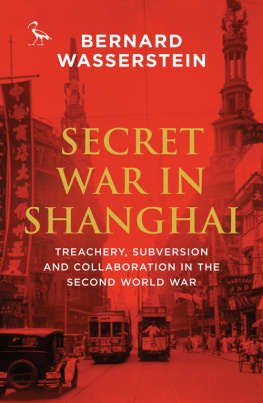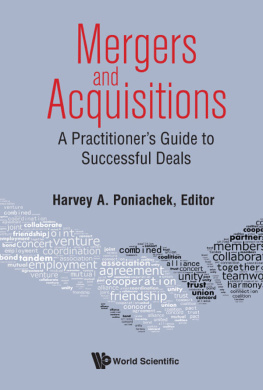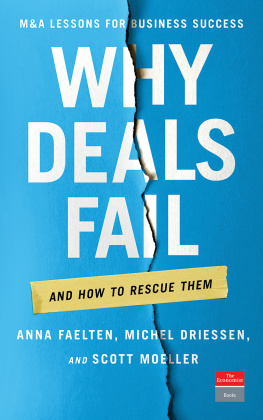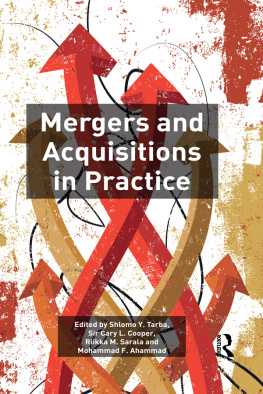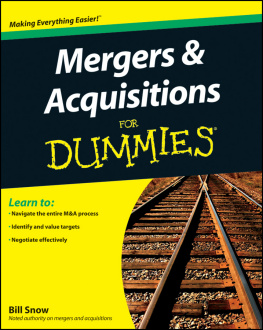Wasserstein - Big deal: 2000 and beyond
Here you can read online Wasserstein - Big deal: 2000 and beyond full text of the book (entire story) in english for free. Download pdf and epub, get meaning, cover and reviews about this ebook. City: New York;United States, year: 2009, publisher: Grand Central Publishing;Warner Business Books, genre: Romance novel. Description of the work, (preface) as well as reviews are available. Best literature library LitArk.com created for fans of good reading and offers a wide selection of genres:
Romance novel
Science fiction
Adventure
Detective
Science
History
Home and family
Prose
Art
Politics
Computer
Non-fiction
Religion
Business
Children
Humor
Choose a favorite category and find really read worthwhile books. Enjoy immersion in the world of imagination, feel the emotions of the characters or learn something new for yourself, make an fascinating discovery.

- Book:Big deal: 2000 and beyond
- Author:
- Publisher:Grand Central Publishing;Warner Business Books
- Genre:
- Year:2009
- City:New York;United States
- Rating:4 / 5
- Favourites:Add to favourites
- Your mark:
- 80
- 1
- 2
- 3
- 4
- 5
Big deal: 2000 and beyond: summary, description and annotation
We offer to read an annotation, description, summary or preface (depends on what the author of the book "Big deal: 2000 and beyond" wrote himself). If you haven't found the necessary information about the book — write in the comments, we will try to find it.
Wasserstein: author's other books
Who wrote Big deal: 2000 and beyond? Find out the surname, the name of the author of the book and a list of all author's works by series.
Big deal: 2000 and beyond — read online for free the complete book (whole text) full work
Below is the text of the book, divided by pages. System saving the place of the last page read, allows you to conveniently read the book "Big deal: 2000 and beyond" online for free, without having to search again every time where you left off. Put a bookmark, and you can go to the page where you finished reading at any time.
Font size:
Interval:
Bookmark:
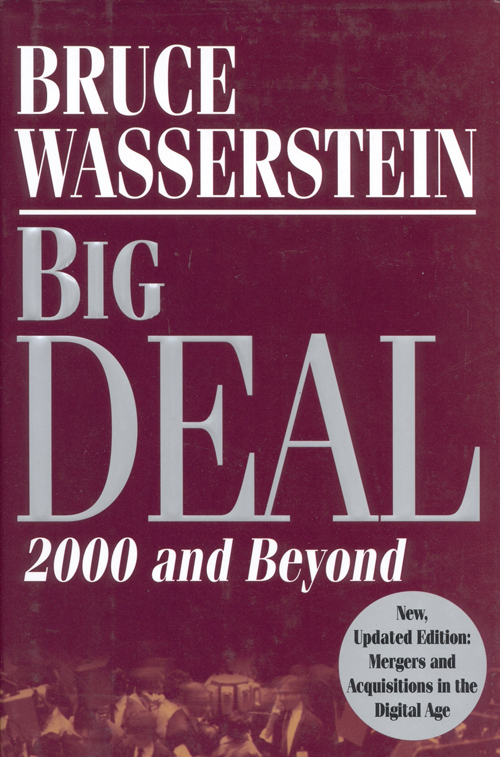
WARNER BOOKS EDITION
Copyright 1998, 2000 by Bruce Wasserstein
All rights reserved. No part of this book may be reproduced in any form or by any electronic or mechanical means, including information storage and retrieval systems, without permission in writing from the publisher, except by a reviewer who may quote brief passages in a review.
Warner Business Books
Hachette Book Group
237 Park Avenue, New York, NY 10017
Visit our Web site at www.HachetteBookGroup.com.
The Warner Business Books logo is a trademark of Warner Books
First eBook Edition: September 2001
ISBN: 978-0-446-55637-8
Wassersteins book is to M&A what Moby Dick is to whaling.
Fortune
Pithy chapter-opening quotes and miniprofiles on such subjects as Viacom Inc.s Sumner M. Redstone and buyout king Henry R. Kravis. And the last third is a thorough primer on the nuts and bolts of tender offers and bear hugs. Wassersteins keen instincts, knowledge of legal and accounting issues, and gamesmanship abilities are apparent.
Business Week
Wasserstein is widely recognized as the father of modern-day mergers and acquisitions. [He] explains what drives mergers and how they get done. He also makes a powerful case for the process, which he says allows U.S. companies to compete and prosper.
USA Today
This edifying look at megabucks corporate deal making unravels the complexities of mergers, buyouts, and takeovers. With an insiders mastery, Wasserstein concludes with a discussion of deal-making fundamentals, from negotiating and merger valuation to financing and gauging a deals future impact. Business buffs and corporate wheeler-dealers will gain an arsenal of tactics and little-known information.
Publishers Weekly
Lucid and engaging. Wasserstein combines breadth of vision with practical insight and a sure sense of relevance. A rare and valuable book.
Robert Clark, dean, Harvard Law School
A stimulating perspective on the current M&A boom.
Financial Times
BIG DEAL is a big deal.
Sanford I. Weill, cochairman and CEO, Citigroup, Inc.
The legendary chairman and CEO of Wasserstein Perella, veteran of over a thousand deals, describes the evolution of modern deal making. Included are profiles of the major players and anecdotal sidebars on some of the more spectacular deals.
Barrons
A deal maker himself, the author takes the reader on a tour of some of the biggest in recent years.
Atlanta Journal-Constitution
Wasserstein possesses a truly encyclopedic knowledge of corporate merger activity. Informative and entertaining.
Kirkus Reviews
Bruce Wasserstein is one of Wall Streets best-known operators. So he is perfectly positioned to bring an insiders view of three decades of high-wire financing, junk bond takeover wars, and no-guts-no-glory Wall Street mercenaries. An engaging story.
Triad Business News
A big book!. Well-researched and fluently written. It provides excellent portraits of the leading leverage buyout firms and their principals, such as Henry Kravis, Teddy Forstman, Carl Icahn, even those fallen stars of yesteryearIvan Boesky, Robert Campeau.
East Hampton Star
A master work from a master of his craft. A rarity: a book that is both readable and informative.
Joseph Flom, senior partner, Skadden, Arps, Slate, Meagher & Flom
A must-read book.
Martin Lipton, senior partner, Wachtell, Lipton, Rosen & Katz
To my wife, Claude,
my love and inspiration
Research Directors:
Qazi Fazal
Roopesh Shah
Andrew Jacobs
Burke Smith
This is the culmination of many peoples helpful insights and assistance. In particular, I wanted to thank my research directors, my colleagues at Wasserstein Perella, my clients and the law firms who have shared so much of their wisdom.
Lucie Longworth, Lisa Desmond, and Crissy Kerr have worked tirelessly to support the effort, and Mort Janklow, my agent, my partners, Jeffrey Rosen, Robert Pruzan, and Mike Biondi, and Larry Kirshbaum, my publisher, were always generous with their time. Most of all, the tolerance and love of my children, Pam, Ben, Scoop, Jack, and Dash, the inspiration of my parents and sisters, and the support of my wife, Claude, were essential to writing the book. I will forever miss the love and assistance of my deceased sister, Sandra W. Meyer.
Bruce Wasserstein
East Hampton
September 1999
When beggars and shoeshine boys, barbers and
beauticians can tell you how to get rich it is time
to remind yourself that there is no more dangerous
illusion than the belief that one can get something
for nothing.
Bernard Baruch, on the 1929 crash Baruch: My Own Story
The speculative financial bubble of the digital age burst and splattered the corporate landscape. Within a year of its high, the technology-dominated NASDAQ index was down 60 percent and Internet favorites plunged more than 90 percent. The management giants of the new age exited as the pygmies of a bygone era, and the financial visionaries of a boom were soon alleged to be the hucksters of a scam. Yet the digital age was only at the end of its beginning, and the corporate structural consequences of this inflection point will be felt for years in the big deal market.
Fueling this explosion was a rare confluence of eventsa financial perfect storm. The reality of dramatic changes in technology and regulation mixed with an inebriated stock market and created a combustible financial environment. This dawning of the digital age was reminiscent of the industrial revolutions of the 1890s and 1920s, with a strong flavor of the 1960s securities boom.
The new economy emerged without an analytical framework for evaluation. In the absence of this necessary context, the religious belief was that the market was in a new paradigm, in which old methods of analysis were no longer valid and new companies could grow forever. Byron Wien, the distinguished market strategist at Morgan Stanley, attempted to question the logic of this new paradigm theory, but his lonely voice was drowned out by the chorus of euphoria, including his own companys technology experts.
If analysts were responsible for propagating a faulty framework, then the media hyped it. The digital era brought the capital markets to the individual, with online investing, day trading, and CNBC emerging as fixtures of daily life. The popular media embraced every moment of it, sensationalizing the ups and downs of the market, promoting investing as a sport for the common man.
The media propelled the most optimistic analysts to fame. These new cultural icons rarely met a stock they thought should be sold. As Yale economics professor Robert Shiller discussed in his seminal book Irrational Exuberance, the hype was without an intellectual foundation, more a matter of emotion than logic, more a reflection of self-dealing and self-promotion than of rational analysis.
Yet corporations increasingly felt the need to constantly be in motion. Standing still in a rapidly evolving world was not an option, but moving forward was necessarily difficult. It was a classic Hobsons Choice. Those who did not pursue evolutionary strategies were penalized by the market as old economy, while many of those who did soon stumbled over lofty valuations and flawed integration strategies.
Font size:
Interval:
Bookmark:
Similar books «Big deal: 2000 and beyond»
Look at similar books to Big deal: 2000 and beyond. We have selected literature similar in name and meaning in the hope of providing readers with more options to find new, interesting, not yet read works.
Discussion, reviews of the book Big deal: 2000 and beyond and just readers' own opinions. Leave your comments, write what you think about the work, its meaning or the main characters. Specify what exactly you liked and what you didn't like, and why you think so.


